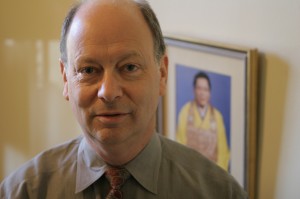Tuesday
Featured StoriesFocusing: An Interview with David Rome
An Interview with David Rome
“The theory behind Focusing is that the body knows a great deal more than the mind; it’s the realm of intuition. If you think about it, the body, the lived body, really is the entire history of the individual up to this present moment.”
David Rome is a Senior Fellow at Garrison Institute and former secretary to Chogyam Trungpa Rinpoche. This interview with David was conducted by Libby Weathers.
How were you introduced to Focusing?
By accident. About 12 years ago I was in a used book store in Vermont, when a tiny paperback, “Focusing” fell into my hands.
What attracted you to this discipline?
For me it met a personal need because I was someone who did not have good access to my feelings. Buddhist meditation gives a wonderful way of working with your mind and making situations more workable because you’re able to have space and detachment. What it is not so beneficial for is actually exploring the situation or feelings themselves.
I think as Buddhism came into Western culture and psyche it did not have all the tools. Focusing has many similarities to mindfulness awareness and starts in a similar place. However, it then gives a very concrete method for staying with a particular content, problem or situation by getting to know it, and allowing it to unfold.
Editor’s Note: We are currently on hiatus from publishing new articles; in the meantime, please enjoy this classic item reprinted from our back issues.
What are the cornerstones of Focusing?
Focusing starts in a similar way to meditation, which is to be still, notice and listen. Next, one draws their attention into the body, especially the torso. There is a process of inquiry through which one can have deep insights into vague or uncertain situations. Its essence is in accessing the felt sense by becoming attuned to how the body is holding situations or problems as they occur to the mind and its continual conceptualizing.
Could you speak to working somatically in a cognitively oriented culture?
The body is different in relation to reality. What the body knows is difficult to access, and Focusing is a bridge between the two. For example, in our work lives, problems and conflicts arise all the time. Things are happening on multiple levels but we are often trying to solve them on just one level. When we are only working in the space of what we have concepts for, we are limited by concepts that repeat themselves.
The 2009 Applied Mindfulness Conference will take place July 23 – 26 at Karme Choling. Hosted by Tail of the Tiger, the conference is gathering mindfulness practitioners to dialogue and share the skillful means they are using to integrate these teachings into their work lives such as educators, health care professionals, business professionals and those involved in social action.
David Rome is one of three keynote conference speakers. David will speak on the contemplative discipline of “Focusing” in “Making Wise Decisions: Engaging the Body as a Source of Deeper Insights.”
What is the theory behind Focusing?
The theory behind Focusing is that the body knows a great deal more than the mind; it’s the realm of intuition. If you think about it, the body, the lived body, really is the entire history of the individual up to this present moment. More than that, it is the entire history of the species of human beings being embodied – we can look back through the entire development of animals, and before that, of plants.
A living organism is by definition, an interaction with its environment. So that’s why we say the body knows so much more than the mind because everything about the body is a knowing, an understanding of the nature of the environment. However, this is not available in conceptual terms. What is available in conceptual terms is just a very narrow slice of that. So in accessing this pre-conceptual bodily knowing there’s a possibility that, like a bolt of lightening, an ability to conceptualize freshly can arise.
This is why I am likening it to intuition because intuition is when you just know something, and you don’t know why you know it, but you do. In Focusing you use a very precise methodology to create a setting in which intuition can happen.
What does working with the body have to offer shamatha practitioners?
Process skipping or spiritual bypassing (referring to the same phenomenon) are names given to what can happen to practitioners to avoid what’s going on and can get in the way of maturing as a person. Because mindfulness awareness gives you a way of taming the mind and getting some control over the wildness of the mind, it relieves some of the pressure of emotional conflict, neurosis, or whatever you want to call it; but that doesn’t mean that it allows the source of those conflicts to be resolved.
What do you plan to offer at the Applied Mindfulness Conference?
Mostly experiential practice in Focusing. I will talk about theory and view, and there will be time for dialogue and exchange, too.
What do you think Chogyam Trungpa might say about this conference?
Chogyam Trungpa’s vision was about this. He recognized the principle that you have to begin with yourself by building from the inside and not rushing out to help others before you really know what you are doing. His emphasis was on creating enlightened society from within the Buddhist sangha to begin with and then expanding out from there.
I think this is a very organic continuation of that. I think we’ve been at this long enough that we somewhat know what we’re doing. We know enough to have the confidence to be offering it to the society at large and looking for how it can be applied in particular sectors of society.
Read David Rome’s article on Focusing, “Searching for the Truth that Is Far Below the Search.”
View the 2009 Applied Mindfulness Conference flyer.
Interviews with conference speakers Mary Campbell, RN, MSN, CNS-BC, “Mindfulness, Healing and Healthcare,” and Michael Baime, MD “Mind, Neuroscience and Mindfulness Meditation,” will follow over coming weeks in the Shambhala Times.







Jun 9, 2009
Reply
David, I am happy to hear about this work and applaud you for doing it and sharing it. I think it a necessary part of our work as practitioners. “Process skipping or spiritual bypassing … are names given to what can happen to practitioners to avoid what’s going on and can get in the way of maturing as a person.” Many in our community still do this, unable to access more intuitive places where wisdom joins intellect.
And for your Deep Listening work, here is a poem for you which I came across this morning, written by a poet/teacher of mine.
Best wishes, Kerry Golemon Schwartz
——————-
When Someone Deeply Listens to You
When someone deeply listens to you
It is like holding out a dented cup
you’ve had since childhood
and watching it fill up with
cold, fresh water.
When it balances on top of the brim,
you are understood.
When it overflows and touches your skin,
you are loved.
When someone deeply listens to you
the room where you stay
starts a new life
and the place where you wrote
your first poem
begins to glow in your mind’s eye.
It is as if gold has been discovered!
When someone deeply listens to you
your bare feet are on the earth
and a beloved land that seemed distant
is now at home within you.
John Fox